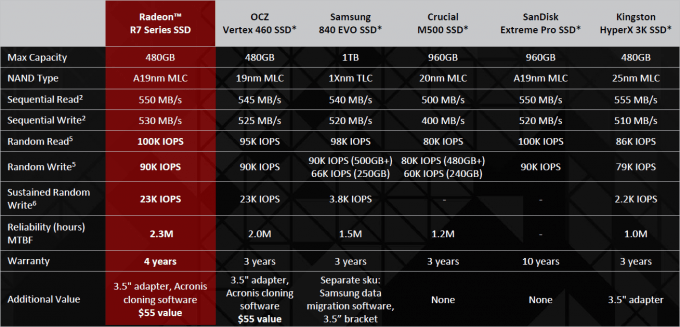- Qualcomm Launches Snapdragon 4 Gen 2 Mobile Platform
- AMD Launches Ryzen PRO 7000 Series Mobile & Desktop Platform
- Intel Launches Sleek Single-Slot Arc Pro A60 Workstation Graphics Card
- NVIDIA Announces Latest Ada Lovelace Additions: GeForce RTX 4060 Ti & RTX 4060
- Maxon Redshift With AMD Radeon GPU Rendering Support Now Available
AMD Announces Radeon R7 Series Solid-State Drives
Talk about unexpected. At a time when fabless SSD manufacturers are consolidating or being snapped up by companies with in-house NAND production, AMD is bucking the industry trend by announcing the launch of the Radeon R7 SSD family.
The company’s Radeon R7 SSDs are powered with a Barefoot 3 M00, the exact same controller found in OCZ’s flagship Vector 150 drives. The R7 Series is targeted specifically at gamers with pricing adopting a middle-ground between the professional brand Vector 150 and mainstream targeted Vertex 460. Performance is on par with the Vector 150, but is rated for 30GB of writes per day over four years and will offer a 4-year warranty to stand behind the R7 series. This compares favorably to the Vertex 460’s 20GB/day and 3-year rating, not to mention the Vertex uses a slightly slower M10 variant of the Barefoot 3.
As one might already suspect, AMD is partnering directly with Toshiba-owned OCZ Storage Systems with OCZ handling the building and distributing of the actual AMD drives. AMD for its part had a say in the firmware design and conducted rigorous testing of R7 drives toward that end. One mentioned figure alone stated that some drives underwent 30,000 unplugs in one month to simulate sudden power failure.
The R7 SSD family will debut in 120, 240, and 480GB capacities with launch MSRP starting at $100, $164, and $299 respectively, although street prices will doubtlessly trend lower. The SSD itself will utilize Toshiba’s latest A19nm MLC flash but will be limited to the SATA 3.0 (6Gb/s) interface over AHCI. AMD will be bundling a 3.5” bay adapter including Acronis True Image HD cloning software for easy system migration.
One interesting tidbit AMD says contributed to its decision to launch its own SSD lineup is that it has been receiving requests from consumers to go this route, given its success with its Radeon memory brand. Somewhat humorous now is that AMD offers its own APUs, CPUs, GPUs, and RAM; now it can add SSDs to its product line-up as well. The only thing missing now are PSUs to build a purely AMD-branded machine again.




